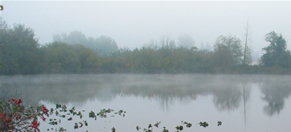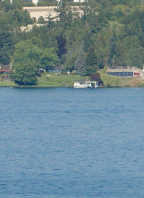Protecting Our Natural Resources Requires Vision and Vigilance.
Thirty years ago I helped found the Mercer Island Recycling Center as a member of the Committee to Save the Earth
(led by Harry Leavitt), and we shared the Washington State Environmental
Excellence Award for it -- the state's highest environmental honor.
I was weaned on Rachel Carson and have continued to support conservation
measures all my life.

I have also taught MBA students and written a book and articles on the relationship between business, trade, and the environment. Conservation and sustainable economic growth go hand-in-hand. Business needs stable, predictable and efficient guidelines within which to grow.
As part of my PhD dissertation I did research in Switzerland. What struck me was not the mountains -- we have equally impressive mountains here. What we can learn from is the integration of business and environment. The Alps have been farmed for over 500 years, in a harmony of human activity and nature.
Fiscally responsible leadership demands protecting our natural resources for the role they play in our economy and in our souls, as well as for future generations.
For example: I-937: I support this measure to provide a cleaner, more affordable energy future. Renewable energy sources (like wind and solar) and energy conservation save us money. It helps our businesses become more competitive for the future. I-937 would ensure that by 2020, 15% of the electricity from Washington's largest utilities comes from sources that do not pollute the air, and that home and business owners get the assistance they need to save energy and reduce monthly bills. Twenty other states have successfully adopted similar programs. I will vote "Yes" on I-937.
Another example, I-933: this Initiative misleads some voters until they understand it better. It plays on fears of the Kelo decision. This is a badly-written bill that would be a boondoggle for lawyers. City governments would be caught in the middle, sued by one side or the other no matter what they did. Cities incorporated after 1996 would effectively lose all their zoning laws, reverting back to their pre-incorporation status. All taxpayer-funded projects (such as paving a particular road) benefit some people more than others (i.e., those who most use that road), but we don't require them to pay extra for these "government givings." It is part of being a community.
I support property rights and measures to streamline bureaucracy, to use informed mediators to quickly resolve individual property-owners grievances, and to cut red-tape. But I-933 goes far beyond this. It would concede waivers to litigious special-interest developers, so they don't have to play by the same rules the rest of us do. It would require taxpayers to either "pay or waive": either pay landowners if laws and regulations affect the value of property, or abandon the measures adopted by democratically-elected governments.
I-933 is opposed by the Seattle Chamber of Commerce, firefighters, the League of Woman Voters, Washington State Labor Council, The Nature Conservancy, all six of Washington’s living former governors: (Gary Locke, Mike Lowry, Booth Gardner, John Spellman, Dan Evans and Albert Rosellini), Gov. Gregoire, and a growing list of Washington organizations and individuals. It is backed by an out-of-state ideological organization, Americans for Limited Government, which is headed and funded by a New York billionaire developer (the aptly-named Howie Rich) and other anti-goverment ideologues. Mr. Rich has already poured more than $7 million into anti-government initiatives in a dozen states, including Washington.
Washingtonians said "No" to this idea once already in 1995, defeating R48 by a 20% margin. I-933 is similar to this and to Oregon’s Measure 37, which costs Oregon taxpayers almost $350 million a year in administration costs, thereby raising taxes and undermining its conservation measures. I-933 would cost Washington taxpayers millions of dollars for the foreseeable future; it would create loopholes for special interests, and would allow for irresponsible development that benefits a few at the expense of us all. If local governments were to pay claims instead of not enforcing regulations, it could cost taxpayers billions of dollars. If passed, I-933 would result in the kind of sprawling, irresponsible developments that increase traffic congestion and overwhelm local education, public safety and other services we all depend upon. It threatens local zoning laws that maintain current property-values. It would create an "open season" on neighborhood standards, communities, and farmlands. Overzealous government bureaucrats should not have the capricious power to arbitrarily deny property rights of anyone. But I-933 goes too far.
This Initiative proposes a radical change in Washington culture. E.g., if a community voted to require school bus-stop shelters in all new developments, a low-ball developer could sue for compensation and force the community to "pay or waive." Rather than seeking a quick buck for a few, we should promote sustainable economic growth that is consistent with our values and quality of life for all, and preserve what we cherish. I will vote "No" on I-933.

